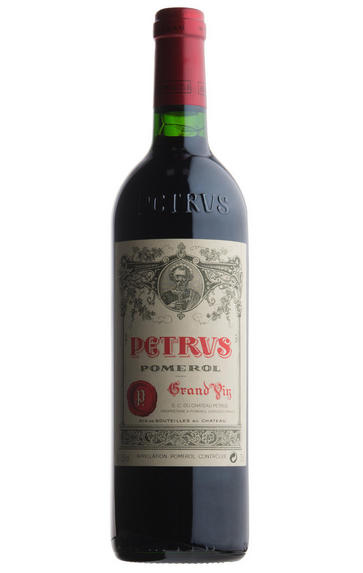
2009 Petrus, Pomerol, Bordeaux
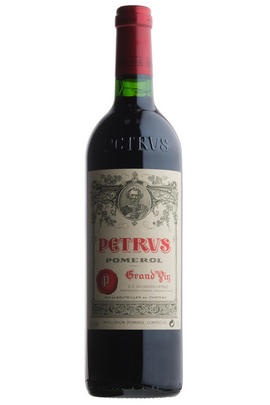
Critics reviews
Lisa Perrotti-Brown - 14/03/2019
(Jancis Robinson MW - jancisrobinson.com - January 2013)
Started picking 18/9 Sep but waited for rains. Mostly picked 1 Oct. Atypical phenological cycle. More like hot places. Acid higher than for most hot years. Very dark crimson. Very subtle and exciting on the nose. Really rich and round and vibrant. Very sweet and exciting. So luscious. Great richness, A certain gentleness of texture. Exciting. Very well mastered - no excess. Very rich too. The tannins very well hidden.
(Jancis Robinson MW - jancisrobinson.com - Apr 2010)
(James Suckling - Wine Spectator - Apr 2010)
This is one of the larger productions of Petrus over recent years, with nearly 3,000 cases of this vintage turned out by proprietor Jean Moueix.
(Robert Parker - Wine Advocate - February 2012)
About this WINE
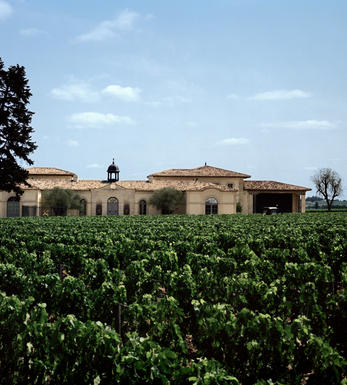
Petrus
Petrus is a wine estate in Pomerol on the Right Bank of Bordeaux. It is among the most celebrated and recognisable wines in the world.
While the estate can trace its history to at least 1837, it flew relatively under the radar until around the 20th century. Madame Loubat, who became the sole owner in 1945, felt that the estate was truly special, and her efforts were instrumental in establishing Petrus on the world stage. She also appointed Jean-Pierre Moueix as the exclusive agent; he and his sons Jean-François and Christian were key in building the estate’s modern reputation. The Moueix family became majority owners here in 1969. In 2018, they were joined by American-Colombian Alejandro Santo Domingo, who purchased a 20% stake.
Petrus is located atop the Pomerol plateau. Most of its vines sit on a so-called “buttonhole” of blue clay soil, known as smectite. This soil’s ability to retain water is a huge benefit in the Pomerol appellation, where drought is a known issue. The vineyard is planted mostly to Merlot.
The estate is run today by winemaker Olivier Berrouet, previously of neighbouring Château Cheval Blanc. Olivier joined in 2008, taking over from his father, Jean-Claude, who had produced 44 vintages of Petrus in his time.
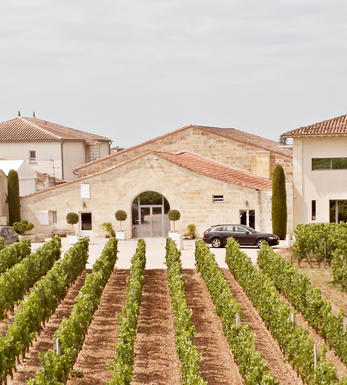
Pomerol
Pomerol is the smallest of Bordeaux's major appellations, with about 150 producers and approximately 740 hectares of vineyards. It is home to many bijou domaines, many of which produce little more than 1,000 cases per annum.
Both the topography and architecture of the region is unremarkable, but the style of the wines is most individual. The finest vineyards are planted on a seam of rich clay which extends across the gently-elevated plateau of Pomerol, which runs from the north-eastern boundary of St Emilion. On the sides of the plateau, the soil becomes sandier and the wines lighter.
There is one satellite region to the immediate north, Lalande-de-Pomerol whose wines are stylistically very similar, if sometimes lacking the finesse of its neighbour. There has never been a classification of Pomerol wines.
Recommended Châteaux : Ch. Pétrus, Vieux Ch. Certan, Le Pin, Ch. L’Eglise-Clinet, Ch. La Conseillante, Ch. L’Evangile, Ch. Lafleur, Trotanoy, Ch. Nenin, Ch. Beauregard, Ch. Feytit-Clinet, Le Gay.
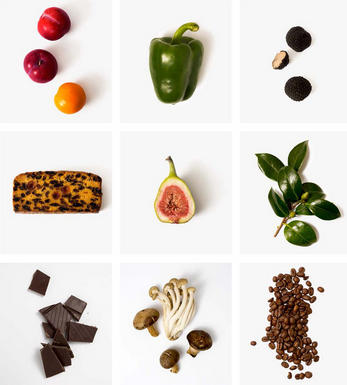
Merlot
The most widely planted grape in Bordeaux and a grape that has been on a relentless expansion drive throughout the world in the last decade. Merlot is adaptable to most soils and is relatively simple to cultivate. It is a vigorous naturally high yielding grape that requires savage pruning - over-cropped Merlot-based wines are dilute and bland. It is also vital to pick at optimum ripeness as Merlot can quickly lose its varietal characteristics if harvested overripe.
In St.Emilion and Pomerol it withstands the moist clay rich soils far better than Cabernet grapes, and at it best produces opulently rich, plummy clarets with succulent fruitcake-like nuances. Le Pin, Pétrus and Clinet are examples of hedonistically rich Merlot wines at their very best. It also plays a key supporting role in filling out the middle palate of the Cabernet-dominated wines of the Médoc and Graves.
Merlot is now grown in virtually all wine growing countries and is particularly successful in California, Chile and Northern Italy.


Buying options
Add to wishlist
Description
An incredible concentration of fruit alongside a glorious freshness and perfect balance define the 2009 Petrus. Intense aromas and flavours of fresh raspberries and blackberries mingle with beautifully ripe, smooth tannins which glide across the palate like silk. Like so many of the very top wines of this vintage, this is elegant, yet effortless, leaving a long, lingering finish and a wonderful sense of harmony.
wine at a glance
Delivery and quality guarantee